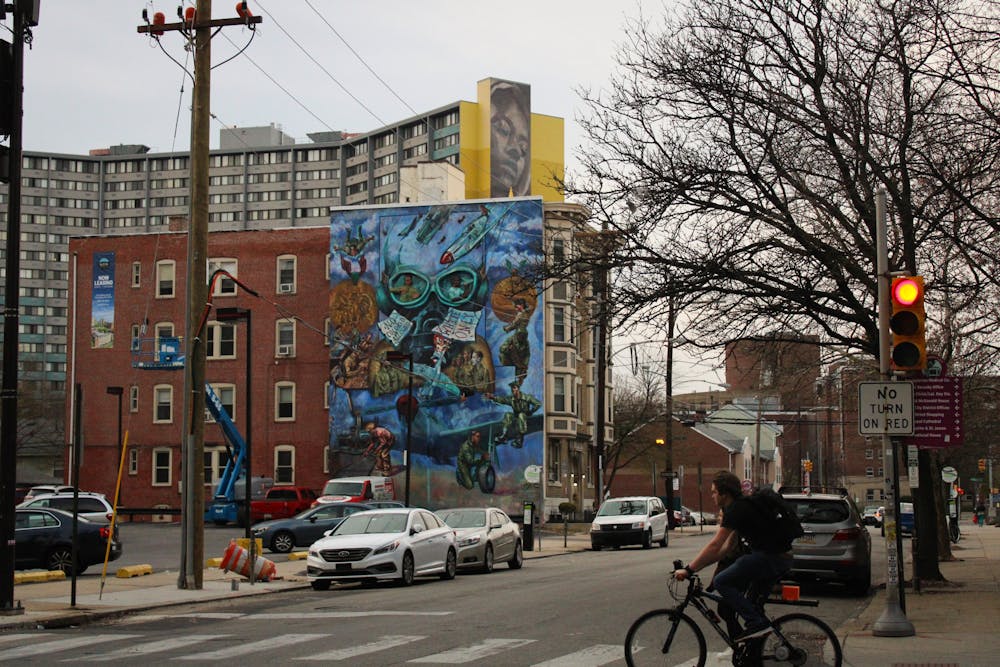
The West Philadelphia Sanctuary is a Penn-led initiative aiming to serve as an equalizing space for the University and the West Philadelphia community.
Credit: Oscar VasquezThe West Philadelphia Sanctuary, an initiative led by a team of Penn undergraduate students and graduate school faculty that aims to combat social isolation in the unhoused population, is set to open on Nov. 1.
The West Philadelphia Sanctuary, housed within the meal distribution site Chosen 300 at 40th and Lancaster streets, will provide access to various living resources and free-to-use spaces. It aims to serve as a third space — an informal gathering place that allows people to interact outside work and the home — for the West Philadelphia community. The sanctuary will initially be open two days a week.
WPS is funded by the Projects for Progress award, which it won in May 2024. The award provides up to $100,000 in University funding for teams piloting practical projects that address social justice issues in Philadelphia.
Philadelphia in particular has seen a decline of third spaces after the COVID-19 pandemic, contributing to feelings of social isolation that the WPS team reported seeing while working in community health.
“One thing we observe is a growing trend of loneliness and social isolation that the patients we serve express,” College and Wharton senior and WPS team member Aravind Krishnan said. “These are not things that can be solved by traditional medical care alone.”
College senior and WPS team member Aurora Yuan echoed the sentiment that medical resources, even free ones, are simply not enough. She described a situation she encountered with a patient a few months ago.
“[The patient] had gone to several free clinics already that week,” she said. “They already had access to those things, but really they just wanted to talk to someone else. They wanted to rant about what was going on in their life.”
WPS intends to provide a space to address those needs, in addition to building connections and accessing resources.
WPS will be accessible to members of the University community. While most buildings on campus require a PennCard or ID for access, the sanctuary will offer an unrestricted space for all members of the community.
“We want this to be a place where it’s as common to study here as it is at Huntsman or somewhere else on campus,” Krishnan said. “That’s really what we envisioned WPS being.”
The WPS team is also working to launch a new Urban Studies undergraduate course, URBS 1600, that will be offered for spring 2025.
The course, titled “Deconstructing Isolation: Exploring the Use of Generative Third Space to Reconnect The City,” seeks to educate students on the impact of third spaces. Students will have the opportunity to go out to the West Philadelphia community and interview community members about a challenge they are facing. The final project for the class involves designing a solution to that problem.
The course will be taught by Kent Bream, a WPS team member and professor of Clinical Family Medicine and Community Health at Perelman School of Medicine.
The WPS team works with individuals from all different backgrounds, including unhoused and at-risk populations. Inclusivity is central to the Sanctuary’s work, according to WPS team member and professor of Oral Medicine at School of Dental Medicine Roopali Kulkarni.
“Many times, there is a preconceived notion when we work with individuals in these situations,” Kulkarni wrote in a statement to The Daily Pennsylvanian. “Breaking down barriers, reducing stigma, and creating a culture of belonging are all critical to ensuring health and well-being for all.”
Some key goals of WPS going forward include recruiting grad students and faculty to provide services to community members, such as legal expungement services, case management and patient navigation, and health screenings, as well as partnering with other local organizations to expand resources. WPS plans to also provide art and music workshops, a free library, a food pantry, and laundry and hygiene services to community members.
In the future, WPS aims to open a location closer to the University to address the unhoused population around campus and to make it more accessible to members of the Penn community. It also hopes to eventually remain open five days a week, from 9 a.m. to 5 p.m.
Volunteer opportunities at WPS are open to everyone, including students, staff, and faculty.
The Daily Pennsylvanian is an independent, student-run newspaper. Please consider making a donation to support the coverage that shapes the University. Your generosity ensures a future of strong journalism at Penn.
Donate






